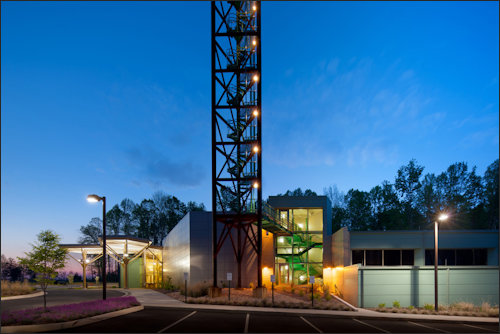
Center for Advanced Engineering and Research in Bedford County. Photo credit: Virginia Hamrick Photography
Expanding its role as the economic dynamo of the Lynchburg metropolitan region, Liberty University has finalized a $4.3 million purchase of the Center for Advanced Engineering and Research (CAER) in Bedford County.
Reports “Work It, Lynchburg“:
For Liberty, the purchase of the CAER facility is an opportunity to build a new research campus on the surrounding 28-acre lot at the New London Business and Technology Center park. The space will serve as the new home for the Liberty School of Engineering and Computational Science.
“This is an exciting step for Liberty University as we expand our presence as a research university and do so at a new location in Bedford County,” Liberty President Jerry Falwell said in a news release from the university. “Our investment in this facility and our commitment to relocate our School of Engineering and Computational Sciences to this site demonstrates our goal to expand our partnerships with business and industry and offer exciting new opportunities for our students.”
Liberty plans to grow its engineering program to 800-plus students and 30-plus faculty and add new undergraduate and graduate degrees along with a new doctorate focused on energy, according to remarks made by Bob Bailey, the executive director of CAER and a member of the LU engineering department advisory board, at a January meeting of the Tobacco Region Revitalization Commission.
Evan Feinman, executive director of the tobacco commission, had described the project as in “financial distress.” An initiative of the Region 2000 economic development group, CAER was originally conceived of as “an industry-focused regional research and development center that drives the development of innovative products and processes by providing local access to university and federal research and inventions.”
Bacon’s bottom line: LU President Jerry Falwell Jr. has set his sights on transforming Liberty University into a religious-oriented, higher-ed powerhouse akin to Notre Dame University or Brigham Young University. From that perspective, acquiring the research center, relocating the school’s engineering and computational sciences program there, and reinforcing ties with regional industries makes total sense. With LU’s resources behind it, the research center could grow into an innovation ecosystem that could spawn new businesses and drive economic growth in the Lynchburg region.
That’s great news for economic development in the Lynchburg region, and it’s a positive sign for the continuing evolution of LU from its origins as a bible college to liberal arts college to online learning pioneer and, now, research university. LU’s business model is highly profitable, and it is investing its non-profit “surplus” into growth.
My main reservation is that Liberty could choose to make its education more affordable by lowering tuition instead — it could perfect a business model of low-cost higher ed that serves as an example to the entire country, thus addressing one of the nation’s major socio-economic crises. Instead, Falwell seems driven to implement a high-prestige, high-cost model of higher ed that is part of the national problem. What a shame. What an opportunity lost. But LU is a private institution, and Falwell is answerable to no one but his own board. Creating a new research university out of fallow fields is a tremendous accomplishment and a not-insignificant consolation prize.


